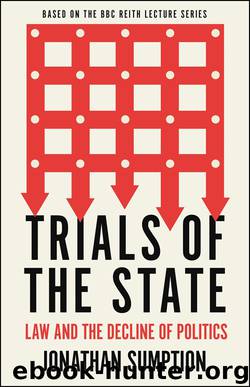Trials of the State by Jonathan Sumption

Author:Jonathan Sumption
Language: eng
Format: epub
Publisher: Profile
Published: 2019-02-24T16:00:00+00:00
* R (F (a child) v. Secretary of State for the Home Department (Lord Advocate and another intervening) [2011] 1 AC 331.
* Huang v. Secretary of State for the Home Department [2007] 2 AC 167, at para. 19.
* R (Nicklinson) v. Ministry of Justice [2015] AC 657.
* Re Northern Ireland Human Rights Commission’s Application for Judicial Review [2019] 1 All ER 173, at [38].
* Hirst v. United Kingdom (No 2) (2005) 42 EHRR 849.
* Scoppola v. Italy (No 3) (2012) 56 EHRR 663.
IV
LESSONS FROM AMERICA
When the French political scientist Alexis de Tocqueville visited the United States in the 1830s, one of the things that struck him most forcibly was the dominant place occupied by lawyers in the public life of the nation. In his classic account of early American democracy, De Tocqueville suggested that lawyers as a class had succeeded to the beliefs and the influence of the old landed aristocracy. They shared its habits and tastes and, above all, its contempt for popular opinion.
The more we reflect upon all that occurs in the United States, the more we shall find that the lawyers, as a body, form the most powerful, if not the only counterpoise to the democratic element of the constitution. […] There is scarcely any political question in the United States that does not ultimately resolve itself into a judicial question.
There was only one other country that De Tocqueville could think of where the legal elite enjoyed a comparable influence over public affairs, and that country was Britain. A new edition of De Tocqueville, rewritten for today, would probably make the same point.
Why do we believe in democracy, or think we do? What are the proper limits of democratic choice? What rights should a democratic constitution protect, even against the will of the people? When the British argue about these questions, they generally look to the United States – sometimes as an inspiration, sometimes as a warning. Yet in spite of a close similarity of political outlook, the American constitutional tradition is the polar opposite of the British one. At its most basic level, the difference is between two models of the state: a legal model and a political one. The Constitution of the United States is the archetypal legal constitution. Britain by comparison has historically been the archetypal political state. In both countries, as well as in much of Europe, we have witnessed a mounting tide of hostility to representative politics over the past three decades. This has naturally been accompanied by a growing interest in the legal model. The United States is not, of course, its only exemplar. Almost every constitution in the world has adopted the legal model, and most of them have been strongly influenced by the American prototype. Constitutions are not just formal documents. They come with habits and attitudes which form over many years to make them workable. It is even more difficult to replicate these habits and attitudes than to make a new constitution. But at a time when many
Download
This site does not store any files on its server. We only index and link to content provided by other sites. Please contact the content providers to delete copyright contents if any and email us, we'll remove relevant links or contents immediately.
| Comparative | Conflict of Laws |
| Customary | Gender & the Law |
| Judicial System | Jurisprudence |
| Natural Law | Non-US Legal Systems |
| Science & Technology |
Future Crimes by Marc Goodman(2997)
American Kingpin by Nick Bilton(2966)
The Meaning of the Library by unknow(2064)
Inside the Middle East by Avi Melamed(1937)
On Tyranny by Timothy Snyder(1857)
Why Nations Fail: The Origins of Power, Prosperity, and Poverty by Daron Acemoglu & James Robinson(1784)
Living Silence in Burma by Christina Fink(1726)
Putin's Labyrinth(1655)
The Mastermind by Evan Ratliff(1589)
Think Like a Rocket Scientist by Ozan Varol(1393)
Law: A Very Short Introduction by Raymond Wacks(1380)
The Smartest Kids in the World by Amanda Ripley(1365)
Leadership by Doris Kearns Goodwin(1346)
The Rule of Law by Bingham Tom(1316)
A Dirty War by Anna Politkovskaya(1311)
It's Our Turn to Eat by Michela Wrong(1299)
Philosophy of law a very short introduction by Raymond Wacks(1295)
Social Media Law in a Nutshell by Ryan Garcia & Thaddeus A Hoffmeister(1248)
Civil Procedure (Aspen Casebooks) by Stephen C. Yeazell(1170)
